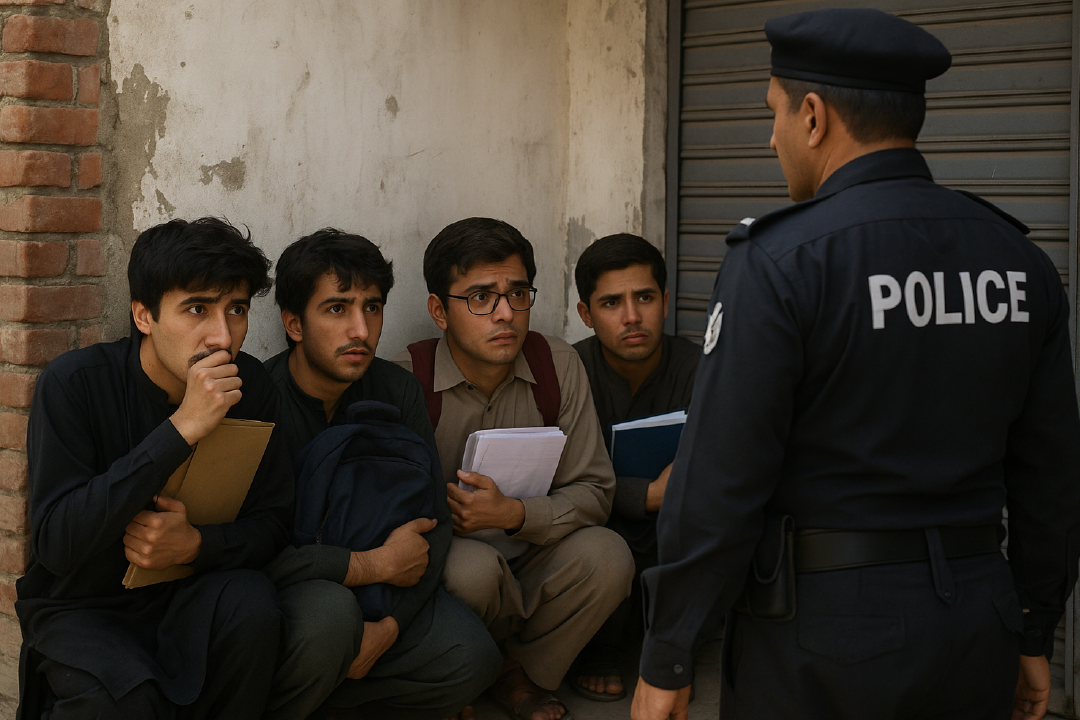Yasmin, belonging to Jalalabad, Afghanistan, came to Peshawar five years ago after completing her FSc. She took admission to the university here and moved in with her uncle whose family was already living in Peshawar. She is now studying in the final semester of BS Dental Technology at the Iqra University, Peshawar.
In Jalalabad, Yasmin used to live with her father and five younger sisters after her mother’s death. When her father got married again, all five of her sisters also came to Peshawar.
“I got all five sisters admitted to different schools. We lived in my uncle’s house. I had to work hard to pay for my own and my sisters’ education expenses. I used to teach at a private school during the day while going to university in the evening and sewing clothes at home at night,” Yasmin shares her story.
According to her, when the evacuation of Afghan refugees began, her uncle went back. Her sisters also had to quit education and return to their native country. Now they are suffering from double suffering. On the one hand, they have no place to live and on the other hand, the conditions of their education are uncertain.
"I have found temporary shelter in the homes of some relatives but they may also have to return. Now I don't understand what will happen to me, will I be able to complete my degree or not?" she wonders.
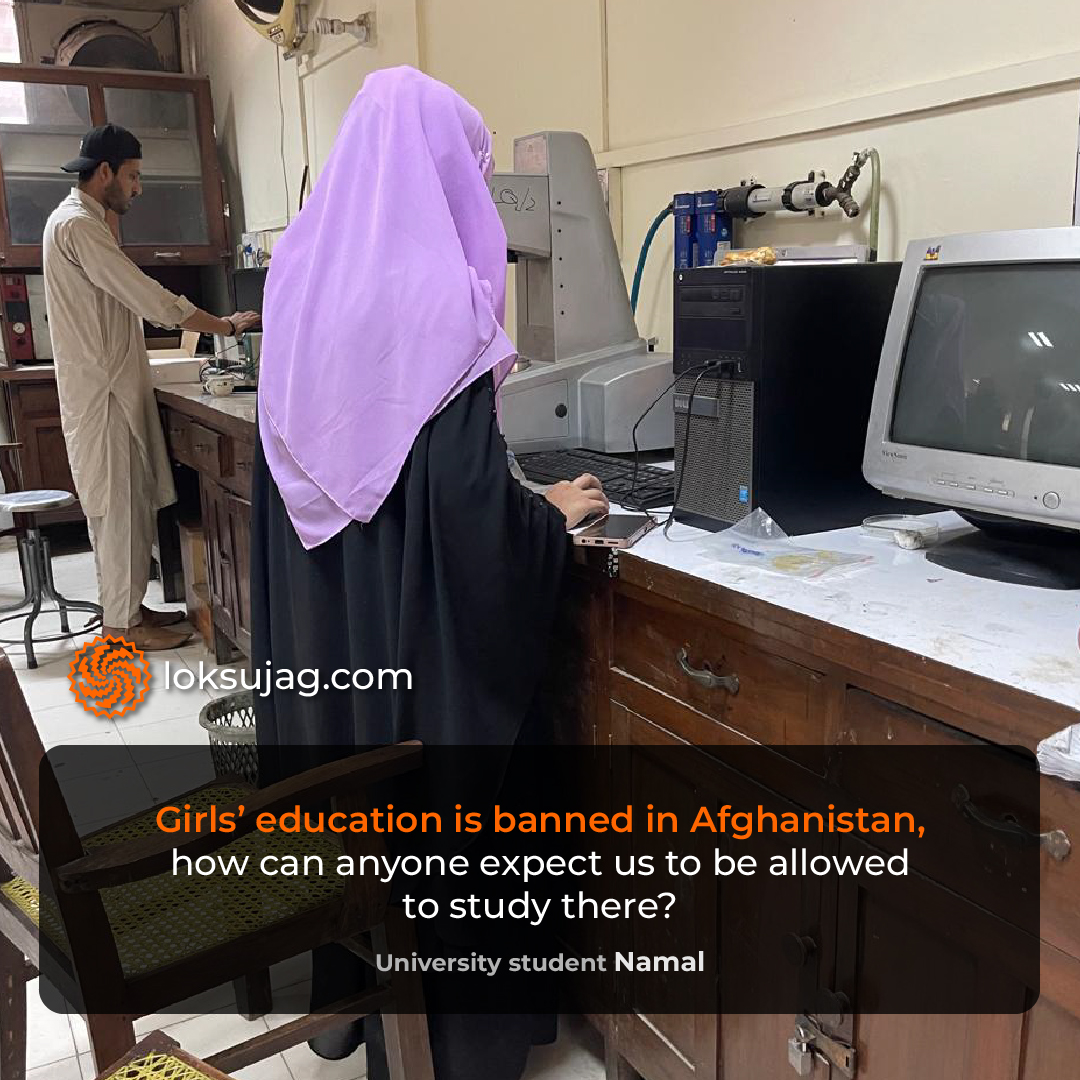
‘I have no idea how I will continue my studies’
More than 10,000 Afghan children are studying in 34,000 schools in Khyber Pakhtunkhwa. According to the Higher Education Department, about 1,500 Afghan students are enrolled in 24 of the province’s 34 universities, including about 150 female students.
The largest number of Afghan students is at the University of Peshawar, which has 247 students, followed by 219 in the Institute of Management Sciences (AIIMS) and 218 in the Khyber Medical University. The data provided by the department shows that 960 Afghan students are studying in these universities on the Allama Iqbal Scholarship and 536 on ‘self-finance’.
Samim Ahmed, who hails from Nangarhar, is studying at the Khyber Medical University. His entire family had migrated to Pakistan 40 years ago. He was born here and got admitted to the university on the Afghan quota after his FSc. He has not been able to focus on his studies for the past two months due to problems.
“My UNHCR Proof of Registration (PoR) card has expired and National Database Registration Authority (NADRA) is not issuing me a new card. Now the police harass us everywhere. I am hiding because I have no legal documents to show them.”
He says that his father has returned to Afghanistan and he lives here with his mother in a rented house, but the landlords often get the house vacated out of fear of the police. If his mother has to return too, he will have no place to stay or any legal documents.
“I have no idea how I will continue my studies in such a situation,” he says helplessly.

Four categories of Afghan refugees in Pakistan
The Afghan refugees in Pakistan are divided into four categories and are issued four different types of cards.
The first is the Proof of Registration (PoR) card, which was issued to refugees by the United Nations High Commissioner for Refugees (UNHCR) and NADRA during the 2006 registration campaign. The validity of this card is renewable and refugees holding it enjoy protection from being deported from Pakistan. They number between 1.3 and 1.4 million and they have access to basic facilities such as healthcare and education.
The second is the Afghan Citizen Card (ACC), which was issued to Afghan refugees who were left out of the 2006 registration drive or who entered Pakistan in subsequent years.
Their identification and record under the government registration campaign was launched in 2017. This card does not have the status of a visa or citizenship document, nor does it grant Afghan citizens legal refugee status. Its holders’ legal rights are limited to basic facilities such as education and health. The number of these card holders is between 800,000 and 850,000.
The third is the Pakistan Origin Card (POC), which NADRA issues to foreigners (including Afghans) whose parents or grandparents were Pakistanis, or who are married to Pakistani citizens. These cardholders can enter Pakistan without a visa, buy property here, open bank accounts and even do businesses. However, this card is also not a substitute for citizenship.
The fourth category is that of Afghan asylum seekers, who have been issued certificates by the UNHCR. They are provided with temporary protection from deportation for six months or one year.
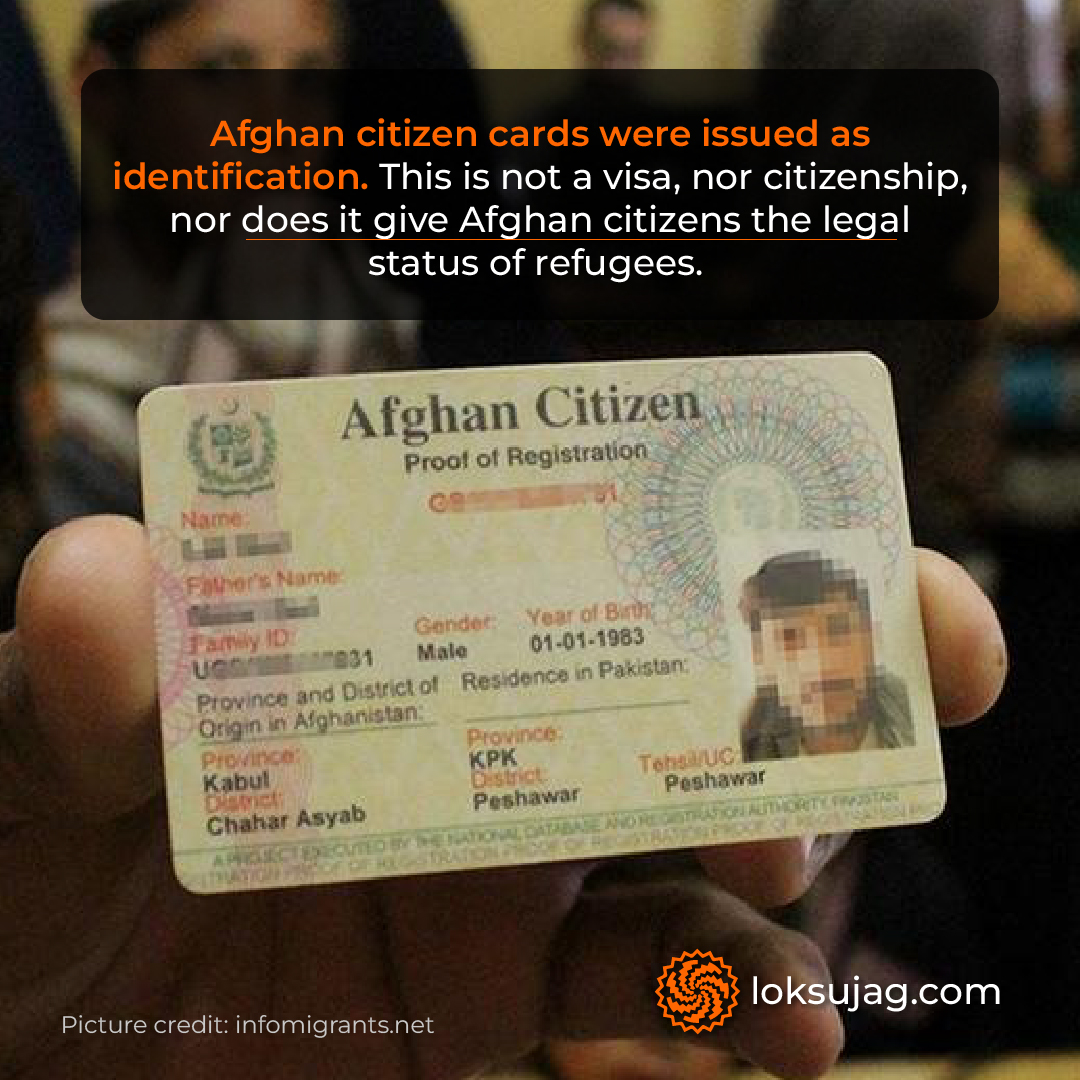
‘How can anyone expect they will allow us to study in Afghanistan’
In the recent government campaign, only Afghan Citizen Card (ACC) holders have been ordered by the Pakistan government to return to Afghanistan. However, PoR card holders are also in fear of being rounded up. The Afghan Commissionerate, the federal agency that oversees refugee affairs, confirms that the Pakistan police are harassing all Afghan refugees, including students, when their PoR cards expire.
“We have raised this issue in meetings with the IG Police, and we were assured that the police will not harass over overdue PoR card holders.”
According to the Khyber Pakhtunkhwa Home Department, 1,239 Afghan refugees have been sent back from April 5 to May 20 this year. A total of 481,285 illegal immigrants have been sent through the Torkham border since September 2023.
After the Taliban came to power, a ban was imposed on girls’ education in Afghanistan, which is why female students studying in Peshawar universities are more concerned. Afghan Consul General Hafiz Mohibullah Shakir, posted in Peshawar, claims that there is no ban on girls’ education and women employment in Afghanistan and many women are also working in Afghan passport offices. However, a student from Paktia,
Afghanistan, at the Namal University, on condition of anonymity, said that due to the ban on girls, many Pakistani female students in Kabul also could not continue their education and had to return.
“How can anyone expect that we will be allowed to study there (in Afghanistan)? We have met the expenses of a private educational institution by working online here. Now we are afraid that we will have to return without getting a degree somewhere.”
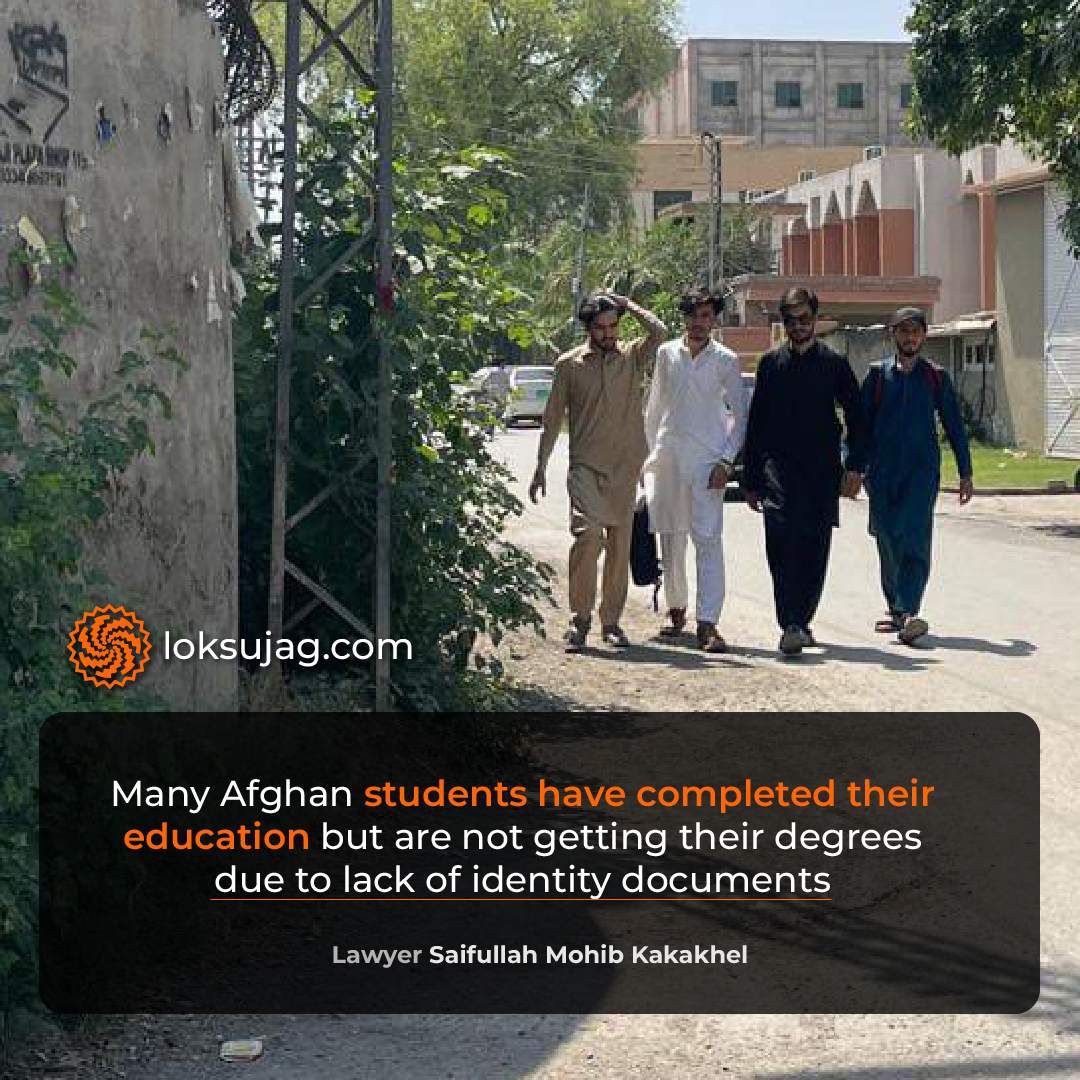
No hostel, no shelter
Senior lawyer of Peshawar High Court Saifullah Mohib Kakakhel says that many Afghan students are coming to him who are worried about getting their degrees after completing their education. They are not getting their degrees due to incomplete identity documents.
“I also get people who have made identity cards in some other name. However, most of the cases are those in which one of the father and mother of the child is Pakistani and the other is Afghan. The ‘B’ form of these children is not being made.”
Ahmed Shah, a BBA student studying on self-finance at AIIMS Peshawar, says that during the last two years, most families have been badly affected financially due to uncertainty in Afghanistan. Students from such families used to do various jobs here to meet their expenses, but now they are facing serious difficulties.
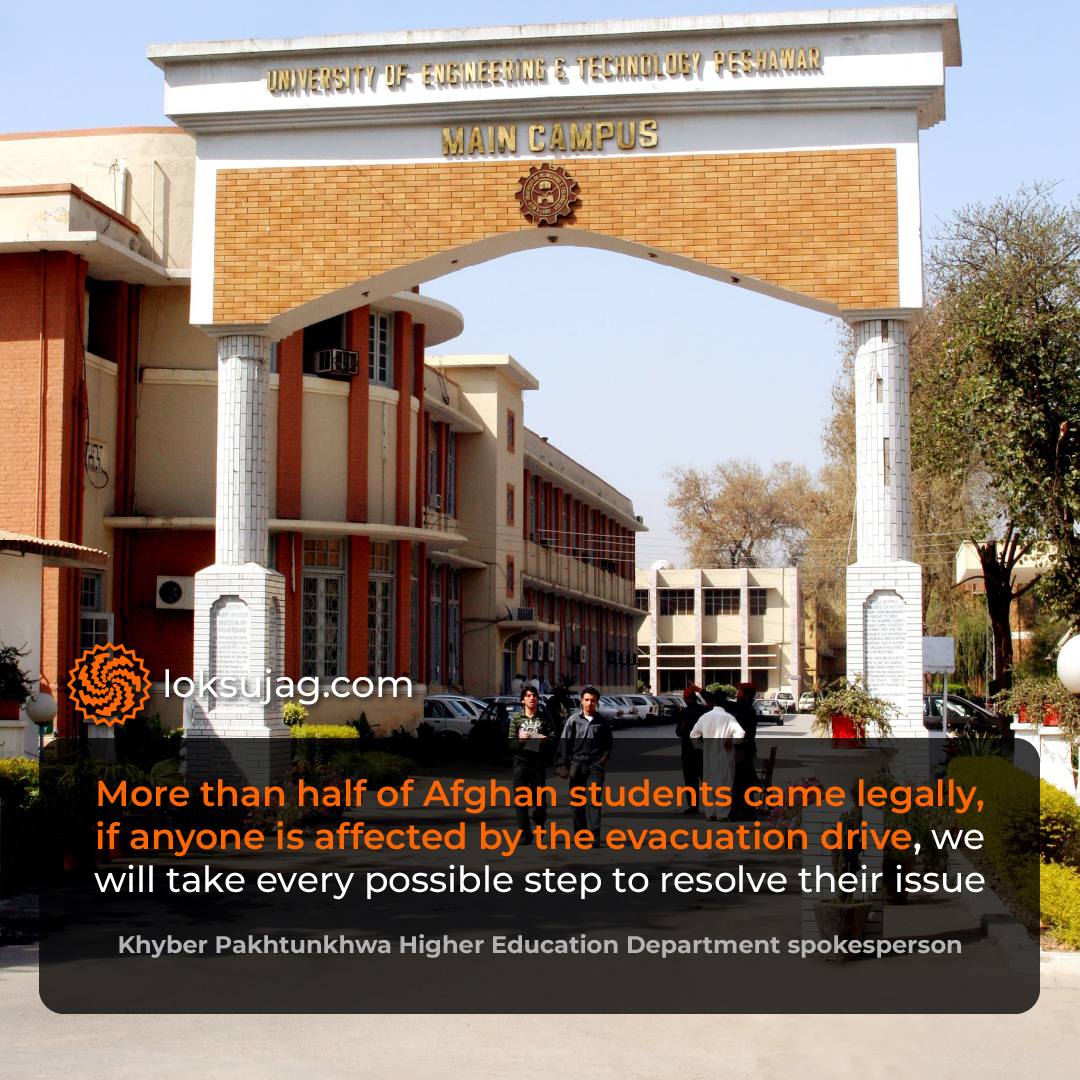
“Most of my fellow students were staying at the houses of relatives who are now deprived of their places. They have no hostel to stay in, no shelter, degrees are in danger and the looming fear of the police is another concern.”
The spokesperson for the Khyber Pakhtunkhwa Higher Education Department Riaz Ghafoor says that more than half of the Afghan students are studying in the universities of Khyber Pakhtunkhwa on scholarships. These people came legally and were admitted only after checking their data. He says that many
Afghan students are staying in the hostels of government universities. However, he assures that if the students are affected by the evacuation of illegal immigrants, then all the details will be taken from the universities and they students will be profiled. The Higher Education Department will take all possible steps to solve their problems.
Published on 4 Jul 2025
